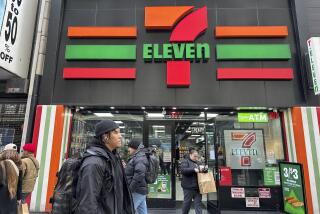Management, KKR Make Formal Bids to Buy Nabisco
- Share via
NEW YORK — The $20-billion auction of RJR Nabisco drew at least two formal takeover offers on Friday, setting in motion a marathon analysis of the proposals for history’s largest corporate acquisition.
Filing to beat a late-afternoon deadline were the two principal rivals for the tobacco and consumer products giant, one group including RJR Nabisco management and the Shearson Lehman Hutton investment bank, and a second led by the Kohlberg Kravis Roberts investment firm.
And as the 5 p.m. deadline neared, Wall Street was awash with speculation that a third offer had come from a dark-horse suitor that included the First Boston investment bank and an investment banking firm backed by the wealthy Pritzker family of Chicago and the Anschutz family of Denver.
At RJR, the process was shrouded by secrecy. Company officials and executives of the bidding groups refused to identify the bidders or provide details of their offers. With the submissions, RJR advisers began a painstaking analysis of the proposals and their financing that is expected to continue around the clock until a five-man special committee of RJR’s non-management directors convenes Sunday.
Military-Style Secrecy
“They’re cloaking this with the secrecy of a military project,” said a Wall Street speculator in takeover stocks. Nonetheless, some predicted that details of the offers would soon leak, noting that dozens of executives, takeover lawyers and investment bankers will be involved in studying the offers in Manhattan over the weekend.
RJR Nabisco stock, which had slumped Thursday on rumors that the KKR group would withdraw its offer, gained ground in heavy trading. The stock rose $1.25 to $84 as 4.27 million shares changed hands, which made it the day’s most heavily traded issue on the New York Stock Exchange.
RJR stock has gyrated all week, as Wall Street has fretted over the prospects of the deal and controversy has raged over the merits of such huge leveraged buyouts. The stock fell as low as $79 Thursday, when trading was temporarily halted for a buildup of sell orders.
The two principal bidders have each already offered more than $20 billion for the nation’s 19th-largest company, which owns such well-known brands as Camel and Winston cigarettes, Oreo cookies and Ritz crackers.
Many on Wall Street expressed confidence Friday that the company would fetch a higher price than has so far been offered. That was a sharp change from Thursday, when Wall Street was swept by rumors that Kohlberg Kravis would withdraw its bid.
The RJR directors are expected to spend all day reviewing the lengthy bids. Then they may reject all bids, recommend that the full board accept one as the winner, or begin negotiations with one of the groups.
Some analysts said RJR’s outside directors have put strong pressure on the bidders to raise their offers by indicating that they intend to get a maximum price for the company, even if it means conducting a piecemeal sale of RJR assets.
George Thompson, an analyst with Prudential-Bache Securities, said it is clear that a variety of other companies would be interested in buying RJR’s diverse holdings. One sign of that was an earlier bid, since withdrawn, by a group that included the consumer products companies Ralston Purina, Procter & Gamble and Castle & Cooke.
“To get top dollar for this company, the directors don’t need to have one of these bidders act as a middleman,” he said. “They can sell off pieces themselves.”
That fact, he said, “puts real pressure on the bidders to put more money on the table.” Thompson speculated that the ultimate price for the company will now be at least $92 a share, topping the current $91-a-share--or $20.6-billion--offer already made by the KKR group.
Some Wall Street professionals predicted that the sale may not be resolved quickly and that the directors may actually disclose the choices to the public in the next few days and indicate which way they are leaning. “The last thing you want to do here is have somebody accuse you of leaving a couple billion on the negotiating table--even if that’s only a small portion of the total price,” said a stock speculator.
More to Read
Inside the business of entertainment
The Wide Shot brings you news, analysis and insights on everything from streaming wars to production — and what it all means for the future.
You may occasionally receive promotional content from the Los Angeles Times.











